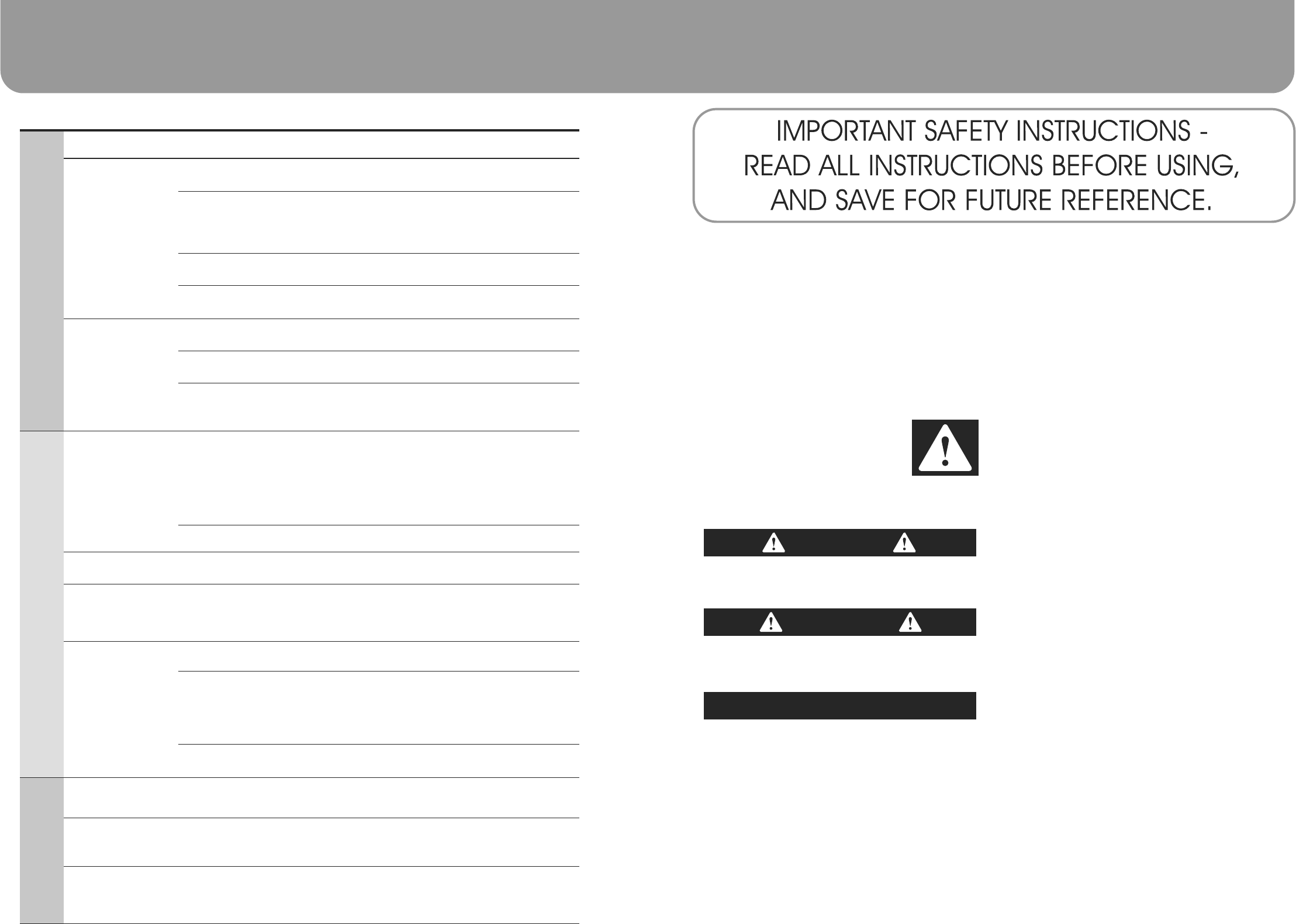
Dishwasher Safety Precautions
DANGER
WARNING
CAUTION
Troubleshooting
Your safety and the safety of others is very important.
Safety messages are displayed in this manual and on
your appliance.
Read and obey these safety messages as they will alert
you to potential hazards and tell you how to reduce the
chance of injury.
Safety Alert Symbol
This symbol alerts you to potential hazards.
Danger
Danger indicates a high level of risk to yourself and others.
Ensure that care is taken to avoid severe injury or even
death.
Warning
Warning indicates a moderate level of risk to yourself, others
and the product. Ensure that care is taken to avoid extensive
product damage or serious injury.
Caution
Caution indicates a level of risk to yourself, others and the
product. Ensure care is taken to avoid moderate product
damage or injuries.
Page 5Page 24
Before Calling for Service, review the following troubleshooting tips.
Problem Possible Causes Solution
Fuse blown, or the
circuit breaker acted
Replace fuse or reset circuit breaker. Remove any other
appliances sharing the same circuit with the dishwasher
Spilled rinse-aid
Always wipe up rinse-aid spills immediately.
Hard water minerals
The affected items are
not corrosion resistant.
The lid of the softer
is loose
A spray arm is
knocking against
an item in a basket
Items of crockery
are loose in the
wash cabinet
This may be caused
by on-site installation
or the cross-section
of the piping.
A program was not
run after dishwasher
salt was added. Traces
of salt have gotten
into the wash cycle.
To clean the interior, use a damp sponge with
dishwasher detergent and wear rubber gloves.
Never use any other cleaner than dishwasher
detergent for the risk of foaming or suds.
Always run the quick wash program
without any crockery in the dishwasher and
without selecting the Turbo function (if present),
after adding dishwasher salt.
Check the lip .Ensure the fix is fine.
Interrupt the program, and rearrange the items
which are obstructing the spray arm.
Interrupt the program,
and rearrange the items of crockery.
This has no influence on the dishwasher function.
if in doubt, contact a suitably qualified plumber.
Detergent with
colourant was used
Make sure that the detergent is the one without
colourant.
Improper detergent
Make sure the dishwasher is turned on and the door is
closed securely.
Check that the water supply is connected properly and
the water is turned on.
Make sure to close the door properly and latch it.
Make sure the power cord is properly plugged into the
wall socket.
Power supply is not
turned on
Error code:E1;
Water pressure is low
Door of dishwasher
not properly closed.
Kink in drain hose
Filter clogged
Kitchen sink clogged
Check drain hose.
Check coarse the filter
(see section titled " Cleaning The Filter ")
Check the kitchen sink to make sure it is draining well.
If the problem is the kitchen sink not draining ,you may
need a plumber rather than a serviceman for dishwashers.
Use only the special dishwasher detergent to avoid
suds. If this occurs, open the dishwasher and let suds
evaporate. Add 3.75 litres of cold water to the tub. Close
and latch the dishwasher, then select any cycle.
Dishwasher will drain out the water at the first step. Open
the door after the draining has stopped and check suds
have disappeared. Repeat if necessary.
Technical problems
General problems
Noise
Dishwasher
doesn’t start
Water not pumped
from dishwasher
Suds in the tub
Stained tub interior
White film on
inside surface
There are rust
stains on cutlery
Knocking noise
in the wash cabinet
Rattling noise
in the wash cabinet
Knocking noise
in the water pipes
















